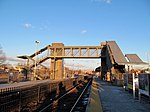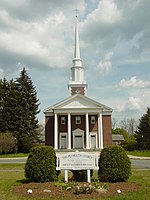Irving Square Historic District
Historic districts in Framingham, MassachusettsHistoric districts on the National Register of Historic Places in MassachusettsMiddlesex County, Massachusetts Registered Historic Place stubsNRHP infobox with nocatNational Register of Historic Places in Middlesex County, Massachusetts

The Irving Square Historic District is a historic district on Irving Square, Waverly, South, Columbia, Irving, Gordon and Hollis Streets in Framingham, Massachusetts. It encompasses a portion of the town's central business district just south of the railroad tracks. It includes buildings on Hollis Street, extending south from Irving Street to Gordon Street, and buildings on Irving from Hollis to just beyond Columbia Street. Most of these commercial buildings were built between 1890 and 1930, most in the 20th century. The district was listed on the National Register of Historic Places in 1982.
Excerpt from the Wikipedia article Irving Square Historic District (License: CC BY-SA 3.0, Authors, Images).Irving Square Historic District
Hollis Street, Framingham
Geographical coordinates (GPS) Address Nearby Places Show on map
Geographical coordinates (GPS)
| Latitude | Longitude |
|---|---|
| N 42.275555555556 ° | E -71.416944444444 ° |
Address
Hollis Street 56
01702 Framingham
Massachusetts, United States
Open on Google Maps







